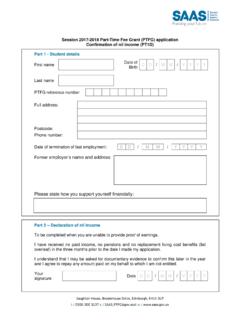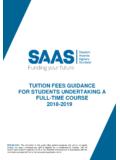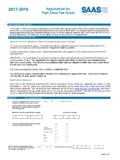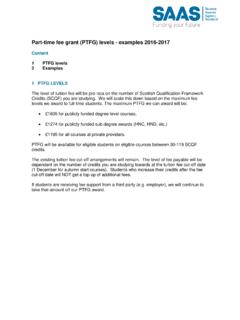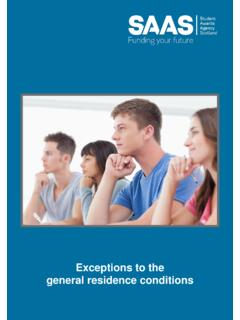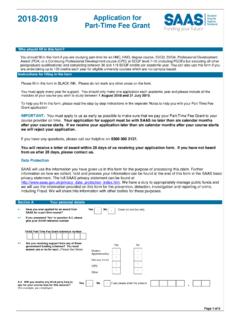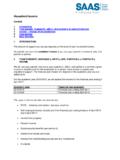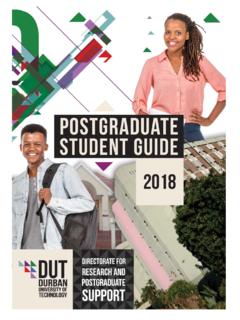Transcription of Guide to Postgraduate Funding 2018-2019
1 1 Guide to Postgraduate Funding 2018 -2019 This Guide is for all full-time and part-time Postgraduate students, except those on the following courses. If you are on one of the courses in the list below, you should read our Guide to undergraduate Funding . Professional Graduate Diploma in Education (PGDE) Post graduate diploma in architecture leading to exemption from the RIBA part II exams Diploma in adult and continuing education Teaching Qualification in Further Education (TQFE) We can give you a version of this Guide and the tuition fee loan form in braille, large print or audio. If you need this, contact us on 0300 555 0505. 2 CONTENTS Important points Page 3 Introduction Page 4 Financial Funding Page 4 General eligibility Page 6 Course eligibility Page 6 Residence eligibility Page 8 Previous study Page 10 Repeat periods of study Page 10 Withdrawing from your course Page 11 Other sources of financial help Page 11 Our commitment to customer service Page 13 3 Important points You should apply online to us as soon as possible.
2 If your application is late there may be a delay in paying your tuition fees to your college or university. You must tell us if there is any change in your circumstances which may affect any award you are due. If we receive your application after the closing date, we will not pay your tuition fees. The closing date for a Postgraduate fee-loan application for session 2018 -2019 is 31 March 2019. Your application for a loan to pay your tuition fees is only valid for one academic session. If you are doing your course over more than one academic year you must apply for a fee loan in all years of your course. Remember to give us all the documents we ask for. 4 Introduction This Guide is for full-time and part-time Postgraduate students applying for a loan to pay their tuition fees and the Disabled Students Allowance (if this applies), for a Postgraduate course that starts in session 2018 -2019.
3 Full-time Postgraduate students can also apply for a living-cost loan. This is paid in addition to the tuition fee loan. The living-cost loan is not available to part-time students. You may receive a loan to pay your tuition fees for certain courses at Postgraduate diploma and masters level. However, we do not fund all Postgraduate diplomas or full masters courses. This Guide tells you which courses we fund and what Funding may be available. This Guide gives general advice only, if there is anything that you do not understand or if we have not covered your circumstances, please contact us for advice. Financial Funding 1. Tuition fee loan 2. Living-cost loan 3. Important loan information 4. The Disabled Students Allowance 1. Tuition fee loan From session 2018 -2019 eligible full-time students, undertaking an eligible Postgraduate course, can apply for a tuition fee loan up to a maximum of 5,500.
4 Eligible part-time students can apply for a tuition fee loan up to a maximum of 5,500 for the course, split across each year of their course, where the course does not take any longer than twice the length of the full-time equivalent course. For example, one year full-time courses could attract two years of part-time support and two year full-time courses could attract four years of part-time support. If you are eligible to receive a tuition fee loan, we will pay the relevant amount, as indicated above, to your college or university on your behalf. The amount of loan we can give you does not depend on you or your household income. If the amount your college or university charges you is higher than the maximum award available to you, you will have to pay the difference yourself. 2. Living-cost loan Eligible full-time Postgraduate students can apply to us for a living-cost loan of up to 4,500. The living-cost loan is split equally across each year of the course.
5 For example: Full-time one year course 4,500 Full-time two year course 2,250 per year To be eligible for the living-cost loan, you must: Be studying an eligible full-time course; and Meet our residence eligibility criteria; and Be under 60 on the first day of the first academic year of your course (the relevant date). If you change course and are aged 60 or over on the relevant date of your new course, regardless of which year you enter your new course, you will not be entitled to a living-cost loan for your new course. The living-cost loan is not available to part-time Postgraduate students or EU nationals coming to Scotland to study. 5 3. Important loan information You must give us your National Insurance number, if you have one.. You will not have to start repaying your loan until the April after you graduate or leave your course. The Student Loan Company (SLC) will expect you to pay 9% of any income you earn over 18,330 a year.
6 You will not have to pay your loan over a fixed period. The SLC will work with Her Majesty s Revenue and Customs (HMRC) to collect repayments. Your employer will take your repayments from your salary and these will show on your pay statement each month. If you are self-employed, HMRC will collect repayments from you through the self-assessment system. If you want to pay your loan off quicker, you can make extra payments direct to the SLC. The SLC will make alternative arrangements to collect your repayments direct if you do not pay UK income tax. Interest on the amount you owe will be linked to inflation in line with the retail price index (RPI). This means the amount you pay back will be about the same in real terms as the amount you borrowed. This will apply as long as the loan lasts and will include any time when you are not studying or not repaying the loan, as well as when you are repaying the loan.
7 You can get more information about how you repay your loan from the SLC or in the booklet Student Loans: Guidance on Terms and Conditions which you can download from their website If we decide not to award you a loan to pay your tuition fees or you fail to apply by the closing date (31 March 2019), you will have to pay your own fees. 4. The Disabled Students Allowance (DSA) If you have a disability or learning difficulty, you may be able claim for certain extra expenses that arise because you are on a course. The amount of Funding we can give you does not depend on your or your household income. We will consider paying the following amounts: Up to 1,725 a year for any small items of equipment or consumables Up to 20,520 a year for Non-Medical Personal Help (NMPH) Up to 5,160 for major items of specialist equipment (this is a total amount for the course, not for each year of your course) You may also claim travel expenses if you have a mobility problem and are not able to use any type of public transport.
8 If you need advice about equipment or any other Funding , the disability advisor at your college or university will be able to help you. If you are still not sure about the equipment and help you need, we can refer you to an access centre. We will pay for you to have a full needs assessment done by a recognised access centre, college or university that has the necessary qualified staff to carry out the needs assessments. If you are applying for the DSA, we will not be able to process your DSA application until we receive your application for a loan to pay your tuition fees. If you don t want a loan to pay your tuition fees, you may still be eligible to apply for the DSA. If you are studying part-time, you can apply for the DSA if you are doing at least 50% of a full-time course and you do not take more than twice the length of a full-time course to complete your course. 6 You can get more information about the DSA on our website Or, you can contact us on 0300 555 0505 (press option 2) for more advice.
9 General eligibility To be eligible for a loan to pay your tuition fees, you must: meet our residence conditions; and be studying an eligible course If you are studying part-time, you must take no more than twice the length of the full-time equivalent to complete your course. If you are receiving tuition fee support from the Scottish Funding Council (SFC), and you are undertaking an eligible full-time course, you may also be eligible to living cost support from SAAS. Please contact us for more details. If you are eligible for Funding at the start of your course, you will stay eligible for the minimum length of your course. If you are not eligible at the start of your course, you cannot become eligible for Funding part-way through your course. We will decide if you meet our residence eligibility conditions. If you are not sure if you are eligible to receive Funding , contact us for advice, giving us full details of your circumstances.
10 Course eligibility 1. Scottish colleges and universities 2. Distance Learning and Masters of Research Courses 3. Postgraduate Intercalated Years 4. Colleges or universities in England, Wales and Northern Ireland 5. Course not covered by this scheme 6. Continuing Students 1. Scottish colleges and universities From session 2017- 2018 , new students are eligible to apply for support to undertake Postgraduate diploma and full masters level courses. Courses will only be eligible to support if they meet the following conditions: Full-Time Courses: The course is a taught* Postgraduate Diploma or Masters Postgraduate Diplomas must be no longer than one year in length Masters courses must be no longer than 2 years in length Part-Time Courses: The course is a taught* Postgraduate Diploma or Masters Students take no longer than twice the length of the full-time equivalent course to complete their studies For example: Postgraduate Diplomas can be funded up to a maximum of two years in length Masters courses can be funded up to a maximum of 4 years in length Full Time Equivalent Part Time 1 year PG Dip or MSc Funding available up to max.

